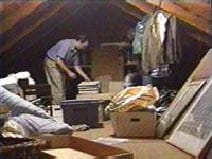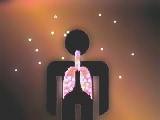Airborne Transmission

For a hantavirus to cause HPS, the virus must travel from the rodents that carry it to a person. A common way this happens is when a person breathes in the hantavirus from the air.
Let’s create an imaginary scenario and go through the process step by step. Say you have a storage room in your home that you hardly ever enter. You keep old furniture there, old newspapers and magazines, and so on.
At some point, a group of deer mice find their way into the room, looking for places to build nests. They found their way into the room through a crack—deer mice can squeeze through holes as small as a shirt button! Some mice chew through the fabric of an old armchair and build a nest inside it. Other mice shred bits of magazines and build nests under the shredded pieces.

A few of these mice are infected with the hantavirus. The infected mice don’t show any signs of being sick. In fact, the virus does not seem to make them ill at all; it simply lives in their bodies. However, the virus is shed continuously from them: into the droppings and urine they leave around the room, and into their saliva, which dries on anything they have chewed, such as nesting material. Out in the environment like this, the virus can live for several days.

Meanwhile, you decide to clean up your storage room. You go inside, spend a few minutes moving boxes and furniture. The mice hear you coming and scurry away, leaving a trail of fresh urine!
Because you find mouse droppings and some of the furniture stuffing the mice have used as nesting material, you get a broom and sweep up the mess. As you move around and sweep, tiny particles of fresh urine, droppings and saliva, with the virus in them, get kicked up into the air. It is these tiny particles that you breathe in—and this is the beginning of becoming sick with HPS.

Because the virus is spread when virus-containing particles are stirred up into the air, an essential HPS prevention tactic in areas showing signs of rodents is to avoid actions that raise dust and to carefully wet the area down with disinfectant. The less chance the virus has to get into the air, the less chance it will be breathed in!